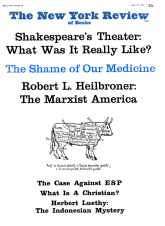In response to:
On Albert Einstein from the March 17, 1966 issue
To the Editors:
The beautifully phrased and delicate venom of Dr. Oppenheimer’s “tribute” to Professor Einstein [Mar. 1] distressed me deeply. I must admit, however, that I am partial to Professor Einstein. His intervention on my behalf in 1940 resulted in my coming to this country and probably saved my life.
My wife and I visited him often in Princeton. We came in contact with a human being full of empathy and warmth, a man of rare selflessness and touching modesty, always ready to oppose injustice, to fight for an underdog, or to help a victim. Dr. Oppenheimer in trying to sum up this “attitude toward human problems of Professor Einstein” suddenly found himself lacking an adequate English word for it and had—characteristically—to use a word in Sanskrit: “Ahinsa,” which he helpfully translated as “harmlessness.”
From the Olympian height of his own background, Dr. Oppenheimer describes Professor Einstein as a man sadly lacking in “background” (as the English say) or “education” (as one would say in America). For a man supposedly lacking education I found Professor Einstein fluent in German, English, French, and Italian and with an excellent knowledge of Latin. I am afraid that his Sanskrit was not too good.
Professor Einstein used to spend his evenings, in the company of his sister (when she was alive), his daughter Margot, and his secretary Miss Dukas, reading aloud his favorite classics, from beginning to end. It took many months to finish Don Quixote or Goethe’s Wilhelm Meisters Wanderjahre. People with “background” might not spend their evenings in such a way.
I remember the heroic stoicism of his last months. He continued his work to the end, trying by sheer force of concentration to forget his tormenting pain. But I also remember his sense of humor, and his deep laughter still rings in my ears. Once he told us how on a bus ride an elderly lady was constantly staring at him. Finally she said, “I am sure that somewhere I must have seen your picture published. Will you, please, tell me who you are?” Prof. Einstein chuckled when he told us: “I said I was a photographers’ model.”
Since I am not qualified to judge Einstein’s scientific achievements, I should like to end by quoting two great scientists.
On May 11, 1933 (i.e., after Hitler’s seizure of power) the originator of the quantum theory and Nobel prize for physics 1919, Max Planck, an Aryan, had the courage to make a speech about Einstein and to say in Plenary Session of the Prussian Academy of Sciences, Berlin that Einstein’s importance…”Could be only compared with Johannes Kepler and Isaac Newton.”
Planck was 21 years older than Einstein. How does the new generation of physicists evaluate Einstein?—On March 14, 1966, during the dedication ceremony of the Einstein Stamp Issue in Princeton University the principal speaker, Professor Chen Ning Yang, born 1922, Nobel prize for physics 1957, said:…”Einstein gave us two revolutions in physical thinking: special relativity and general relativity, and contributed to and shaped a third—quantum mechanics.”—Yang’s evaluation of Einstein is: “the greatest physicist of our time, and with Newton one of the two greatest physicists of all times.”
Philippe Halsmann
New York City
This Issue
May 26, 1966



